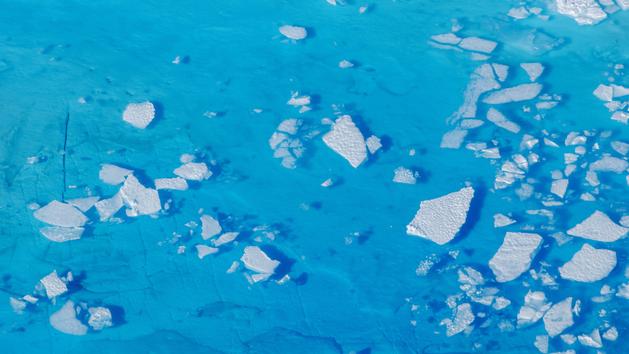The melting of the Greenland ice sheet will cause sea levels to rise more sharply in the 21st century than in any other century for 12,000 years, even if global warming is contained, according to a study published Wednesday, September 30.
Read also: In Greenland, the main glacier in the Arctic is fracturing under the effect of the heat
This study, published in the journal
Nature
, based on ice samples and models, reconstructs for the first time the history of the ice melting of this cap during the entire Holocene, a geological period that began 11,700 years ago.
It also concludes that if greenhouse gas emissions continue at the same rate, the layer of ice of several kilometers could shrink by 36,000 billion tons between 2000 and 2100, enough to raise the oceans by 10 cm.
The ice cap lost more than 500 billion tonnes in 2019
Until the late 1990s, this sheet of ice was gaining roughly as much mass from snowfall as it was losing in summer with glacier collapse and ice melt.
But this balance has been upset by the acceleration of climate change.
Read also: Record melting of the Greenland ice sheet in 2019
Last year, the Greenland ice cap lost more than 500 billion tonnes - a record since the start of satellite data in 1978 - contributing 40% to sea level rise in 2019. And unless l mankind drastically reduces greenhouse gas emissions, it could become "
the new normal,
" said lead author Jason Briner of the American University at Buffalo.
"
Whatever the future CO2 emissions, the Greenland ice cap will lose more ice during this century than during the hottest periods of the last 12,000 years
", he told AFP, noting nevertheless with hope that humanity can influence the future of Greenland.
"
Rising sea level
"
The cap theoretically contains enough water to cause the oceans to rise seven meters, but a complete melting would take hundreds or even thousands of years.
On the other hand, even a rise in the oceans of a few tens of centimeters already has devastating potential for the coastal areas of the planet.
Read also: In Greenland also the statues are falling
The 12,000-year chronology reconstructed by this study, which required five years of work, makes it possible to separate the natural fluctuations of the mass of ice from the impact of climate change caused by man.
Limiting this warming to + 2 ° C compared to the industrial era, the minimum objective of the Paris Agreement, would reduce the contribution of the ice sheet to sea level rise to 2 cm by the end of the century. .
But this increase would inexorably continue in the following centuries.
“
Without a doubt, we will see an increase in ocean levels during this century.
But without changing course now, this increase will disrupt life on almost the entire planet,
”said Jason Briner.
In the last century, sea level rise was mainly linked to the melting of glaciers and the expansion of warming seawater, but in the last 20 years, the Greenland and Antarctic caps have been become the main cause.

